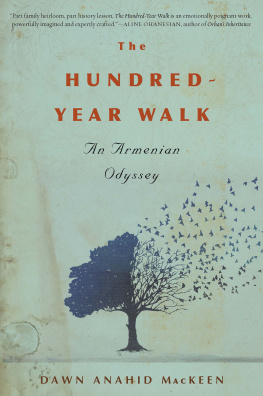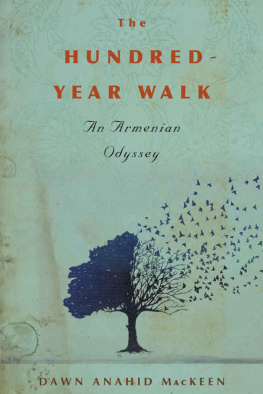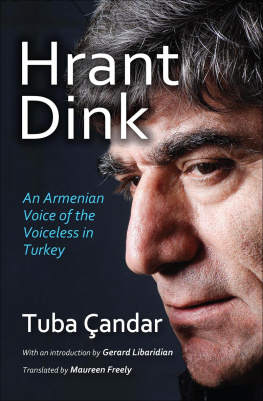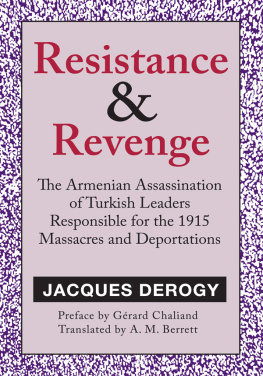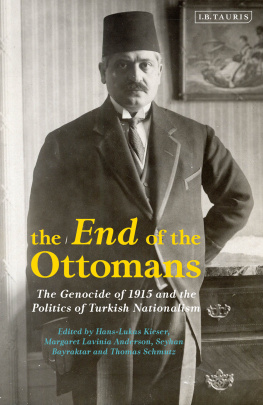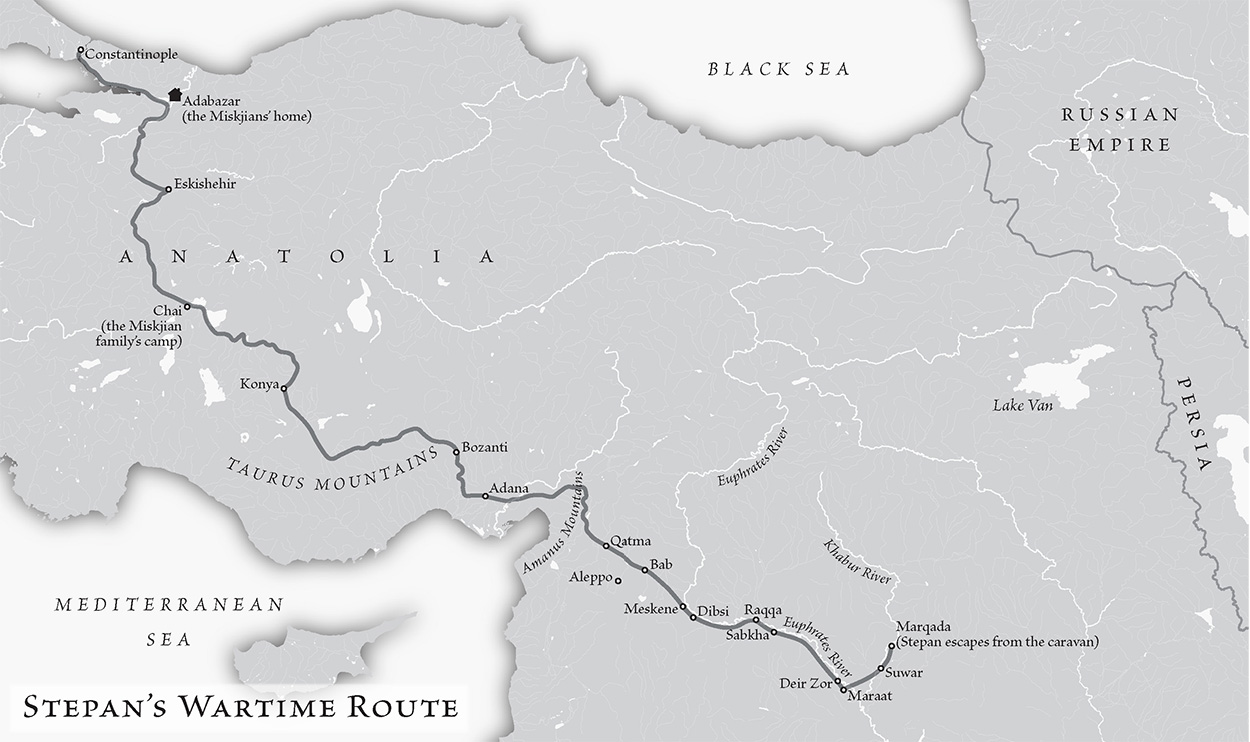First Mariner Books edition 2017
Copyright 2016 by Dawn Anahid MacKeen
All rights reserved
For information about permission to reproduce selections from this book, write to or to Permissions, Houghton Mifflin Harcourt Publishing Company, 3 Park Avenue, 19th Floor, New York, New York 10016.
www.hmhco.com
This is a work of nonfiction. All dialogue, details, and events in the life of Stepan Miskjian are directly culled from his memoirs, interviews, or other historical works.
Note: Some names and locations have been changed to protect sources in Syria.
Library of Congress Cataloging-in-Publication Data
MacKeen, Dawn Anahid.
The hundred-year walk : an Armenian odyssey / Dawn Anahid MacKeen.
pages cm
Includes bibliographical references.
ISBN 978-0-618-98266-0 (hardcover) ISBN 978-0-544-58292-7 (ebook) ISBN 978-0-544-81194-2 (pbk)
1. Miskjian, Stepan, 18861974. 2. Armenian massacres, 19151923. 3. World War, 19141918Armenia. 4. Armenian massacres survivorsBiography. 5. Young menArmeniaHistoryBiography. 6. EscapesArmeniaHistory20th century. 7. Desert survivalSyriaHistory20th century. 8. MacKeen, Dawn AnahidFamily. 9. MacKeen, Dawn AnahidTravelTurkey. 10. MacKeen, Dawn AnahidTravelSyria. I. Title.
DS 195.5. M 315 2016
956.6'20154092dc23
[B]
2015016713
Map by Mapping Specialists, Ltd.
Cover design by Martha Kennedy
Cover art Philipp Igumnov/Getty (tree); Tetra Images/Getty (paper)
v3.0718
To my mother, Anahid
A Note on the Translation
T HIS BOOK SHIFTS between the early-twentieth-century Ottoman Empire and the present day. All languages in these pages have been transliterated and translated for ease of reading rather than technical precision. That includes my grandfathers primary languages, western Armenian and Ottoman Turkish. In most cases, the Armenian has been transliterated as a u; thus the u in the name Harutiun is pronounced like the French ou. On the other hand, the name of the books main character, my grandfather Stepan Miskjian, is pronounced Ste-pan Meesk-geean. Modern Turkish, the language spoken in Turkey today, uses the Latin alphabet, unlike Ottoman Turkish. It, too, has been transliterated for easier pronunciation; for example, the name Cemal has been changed to Jemal, and my grandfathers town, Adapazar, has been changed to Adapazar, the last syllable of which is pronounced like the a in serial. Ottoman endings in d and b, which often appear as t and p, respectively, in modern Turkish, have been left unmodified in the chapters that take place during Ottoman times. The Arabic has been transliterated to the most common forms. In addition, all dates have been changed, as best as possible, from the Julian calendar, used during my grandfathers time, to the Gregorian calendar.
PART ONE
Before
The Lost World
2006
For as long as I can remember , my mother has been talking to her dead parents. Growing up, I would find her in the kitchen, locked in conversation with Mama and Baba. At the sink, her hands scrubbing a dish, her voice a murmur. So it was no surprise when, in the summer of 2006, I stumbled on her again like this. It had been just a few weeks since I had moved back into my childhood home, and there I was in the doorway trying to eavesdrop, just like I had back in grade school. Only now I was thirty-five. I couldnt quite make out her words, drowned as they were by running water and the clank of Corelle plates. Oblivious to me standing there, my mother continued to shake her cropped brown bob back and forth, moving her lips furtively.
Inch ge medadzes, she said, shaking her head, the Armenian words sounding like gibberish to me.
Are you talking to them again? I asked.
Yes, she replied, her mood perennially upbeat. I ask them for advice, and they always give it to me. They are my spirit guides, Dawn. They should be yours too!
I rolled my eyes and we both laughed, not taking ourselves too seriously. In the weeks since Id left my bustling life in New York and returned to the Los Angeles house where I had been raised, my mothers otherworldly talks had become part of my universe again. Id forgotten the never-ending surprises of life with my small but plucky mother, Anahid. Spontaneous and excitable, she could transform a drab doctors office or a corner diner into a party, just by raising her arms and breaking into dance.
My father, Jim, and I would remark that she was the last person youd expect to be a probation officer. She was unflinchingly positive about the human capacity for goodness, allowing the petty criminals she supervised to get away with nearly anything on her watch. Shed devoted her life to helping people. Not only her clients, but also Armenian immigrants unfamiliar with the customs of the United States. Our phone was constantly ringing. Shed taught my American father and me just enough of the language for us to say One moment in ArmenianMeg vayrgeanwhen people called and started prattling away about needing a ride to the doctor, the lawyer, or the green-card office.
Despite the comfort of being back in my roomy, Spanish-style home, the initial excitement had worn off. Huddled under my flower-print bedspread, surrounded by high-school soccer trophies and my homecoming-princess tiara, I felt like a character in a dark comedy about an aging prom queen who returns to her childhood home after flaming out in the big city. By the hour, my life in New York felt farther awaymy morning runs through snowy Central Park before work; my deadline hustle to file yet another health-care story at my magazine job; my race to meet friends after work for a wine-fueled late dinner somewhere dark and candlelit. For years, my life in New York had felt like a sprint in a marathon that I never wanted to stop. It was what I craved; it was what I thought I needed; it was why Id left my home and moved across the country in the first place.
But shortly after my birthday the previous February, something had changed. Id never paid much attention to my mothers calls to come home, but suddenly I couldnt ignore her anymore. Perhaps it was her advanced age (she was then seventy-eight). Or maybe it was my own realization that, as a reporter, I was spending my life telling other peoples stories and ignoring my own familys incredible one.
Because my grandfather had died when I was a toddler, what I knew about him was mostly family legend. Countless times, I had heard the dramatic tales from my mother of how her father, Stepan Miskjian, had wandered in the desert of what is now Syria, how he had staggered across it for a week on nothing but two cups of water. How he had led a group of Armenians to safety, away from the Turks who wanted to kill them.
Shed repeat this tale on loop. As she saw it, any occasionduring a morning bowl of Cheerios or after a piece of birthday cakewas the right time to recount her fathers near-death experience.
His story had truly haunted her childhood too, when days would begin and end with Baba in tears as he retold what hed witnessed. He made a new home for his family in Spanish Harlem, but they were so poor she slept in a hammock. Perhaps looking into his daughters innocent face reminded him of the thousands of children in their orphan uniforms who had paraded past him in the camps on their way to be slaughtered. He had lost almost everything in the ethnic cleansing; all he had was his story. This was our familys heirloom, our most precious bequest, and it was inherited by every subsequent generationalong with the burden of telling it again.

